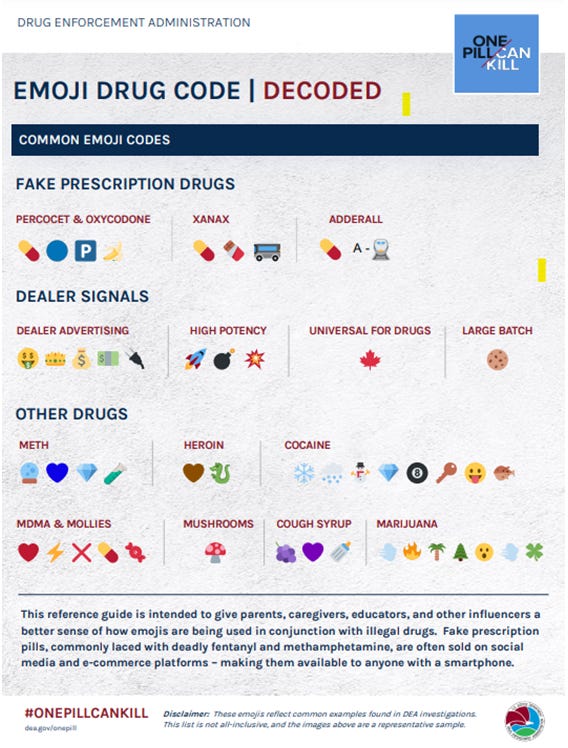Cracking the Emoji Code: DEA Alerts Parents to Hidden Dangers on Social Media
The Drug Enforcement Administration (DEA) has issued a warning to parents about the growing trend of using emojis to communicate and facilitate illegal activities on social media platforms. The DEA urges parents to be vigilant and stay informed about this new and evolving online language to prevent the spread of drug use and sales among teenagers and young adults.
Emojis, small digital images or icons used to express an idea or emotion, have become increasingly popular for communication on social media platforms. While these colorful icons are often used to convey innocent messages, the DEA has discovered that drug dealers and users now employ emojis to discuss and arrange illicit transactions. These messages can include code phrases and symbols representing specific drugs, quantities, and prices.
The DEA has identified several emojis commonly associated with drug-related activities, such as:
💊 (pill) — Refers to prescription drugs or ecstasy
🍁 (maple leaf) — Represents marijuana
🍚 (rice) — Represents cocaine
💉 (syringe) — Represents heroin or other injectable drugs
🚬 (cigarette) — Represents marijuana joints or blunts
Using emojis as a form of code, criminals can evade detection and continue to operate their illegal activities. The DEA encourages parents to familiarize themselves with these and other potentially incriminating emojis and monitor their children’s social media usage.
The table below provides a list of emojis that the DEA has decoded as drug codes.

To help parents and caregivers better understand and identify potential signs of their child’s involvement in illegal activities online, the DEA has provided more context and elaboration on the red flags mentioned earlier:
Sudden changes in online behavior or usage patterns: If your child’s screen time significantly increases or suddenly begins accessing social media or messaging apps at unusual hours, this could indicate involvement in illicit activities. Pay attention to any unusual or secretive online behavior.
Frequent use of emojis or code words that may be linked to drug-related activities: Certain emojis and phrases can represent drugs, quantities, and prices. Notice your child frequently using these emojis or code words or exchanging messages with unfamiliar individuals that include such symbols. It may be worth discussing the matter with your child.
The secrecy surrounding social media accounts or online activities: If your child is unusually secretive about their online activities or refuses to share any information about their social media accounts, this could be a sign that they are hiding something. Encourage open and honest communication, and consider setting rules or boundaries for device usage and social media access.
Unexplained packages arriving at the residence: One standard method of distributing illegal drugs is through mail or package delivery services. If you notice unfamiliar packages arriving at your home, especially those that are addressed to your child, it’s essential to investigate the contents and discuss the matter with your child.
Sudden changes in a child’s social circle or behavior: If your child suddenly becomes distant, withdrawn, or exhibits changes in their personality, this could indicate involvement in illegal activities. Additionally, a sudden change in their friend group or frequent interactions with unfamiliar individuals may also warrant concern. Engaging in open and honest conversations with your child about their social life and activities can help uncover potential issues.
As a parent or caregiver, it’s essential to maintain a supportive and open line of communication with your child. Make sure they feel comfortable discussing any concerns or issues they may be facing, and educate them about the risks and consequences of engaging in illegal activities, both online and offline. By staying informed and involved, you can help protect your child from the dangers associated with drug use and other illicit activities.
As a cybersecurity consultant, I strongly recommend that parents maintain open communication and stay informed about their children’s online activities, particularly messaging and texting. Parents must understand the potential risks and dangers associated with online communication, such as cyberbullying, exposure to inappropriate content, and involvement in illegal activities. Parents may also research apps that provide them with tools to monitor their children’s activities without invading their privacy. They can create a supportive environment that empowers children to navigate the digital world responsibly while respecting their privacy by keeping an open dialogue and educating their children about online safety.


